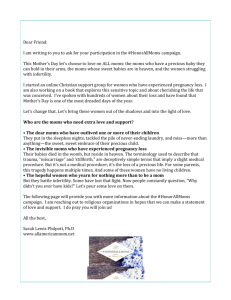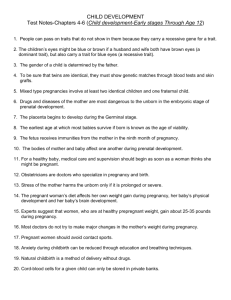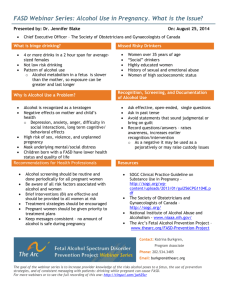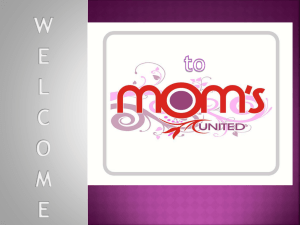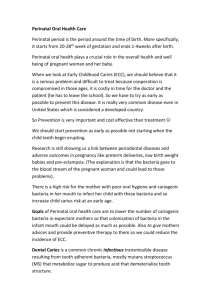Continue Reading - The Mighty Mouth
advertisement
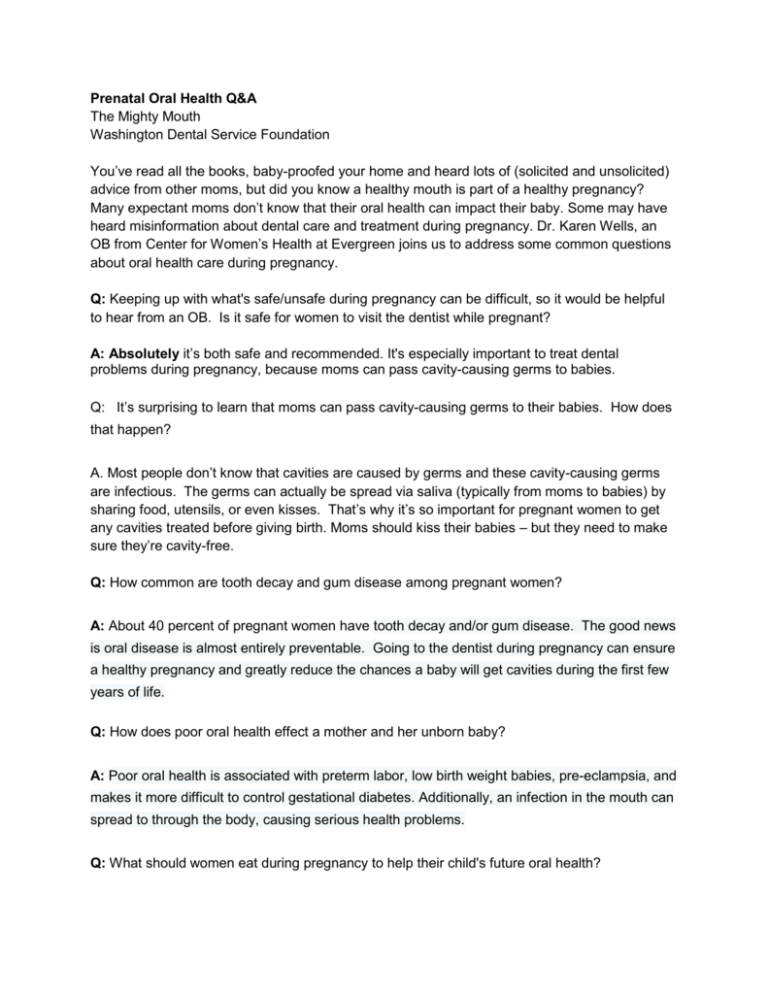
Prenatal Oral Health Q&A The Mighty Mouth Washington Dental Service Foundation You’ve read all the books, baby-proofed your home and heard lots of (solicited and unsolicited) advice from other moms, but did you know a healthy mouth is part of a healthy pregnancy? Many expectant moms don’t know that their oral health can impact their baby. Some may have heard misinformation about dental care and treatment during pregnancy. Dr. Karen Wells, an OB from Center for Women’s Health at Evergreen joins us to address some common questions about oral health care during pregnancy. Q: Keeping up with what's safe/unsafe during pregnancy can be difficult, so it would be helpful to hear from an OB. Is it safe for women to visit the dentist while pregnant? A: Absolutely it’s both safe and recommended. It's especially important to treat dental problems during pregnancy, because moms can pass cavity-causing germs to babies. Q: It’s surprising to learn that moms can pass cavity-causing germs to their babies. How does that happen? A. Most people don’t know that cavities are caused by germs and these cavity-causing germs are infectious. The germs can actually be spread via saliva (typically from moms to babies) by sharing food, utensils, or even kisses. That’s why it’s so important for pregnant women to get any cavities treated before giving birth. Moms should kiss their babies – but they need to make sure they’re cavity-free. Q: How common are tooth decay and gum disease among pregnant women? A: About 40 percent of pregnant women have tooth decay and/or gum disease. The good news is oral disease is almost entirely preventable. Going to the dentist during pregnancy can ensure a healthy pregnancy and greatly reduce the chances a baby will get cavities during the first few years of life. Q: How does poor oral health effect a mother and her unborn baby? A: Poor oral health is associated with preterm labor, low birth weight babies, pre-eclampsia, and makes it more difficult to control gestational diabetes. Additionally, an infection in the mouth can spread to through the body, causing serious health problems. Q: What should women eat during pregnancy to help their child's future oral health? A: Women should eat foods high in protein and fiber, like meats, cheeses, beans, nuts, fruits and vegetables. Avoid starchy and sugary foods and sweetened drinks (including juice, soda, and sports drinks), they feed the bacteria that causes cavities. Q. What else should pregnant women do to take care of their oral health? A. Brush twice a day with fluoride toothpaste, floss daily, drink plenty of water, (fluoridated water is best). They can also use xylitol, fluoride and antibacterial rinses prescribed by a dentist or doctor. Q: Is it true that chewing gum w/ Xylitol can help reduce cavity-causing bacteria? A: Yes, Xylitol is a natural sweetener that reduces cavity-causing germs. Pregnant women should chew Xylitol gum or candy after eating. Xylitol gum is calorie-free and has no effect on blood sugar. Q: What are some things women can do to keep their baby’s teeth and gums healthy? A: Do not put babies to bed with bottles or cups full of milk, formula, or sugary drinks. Milk, formula, and juice can lead to significant tooth decay. See other helpful parent tips: http://bit.ly/1ql8iB9 Q: When should children have their first oral health checkup? A: Babies should have their first oral health checkup by a dentist or a medical provider by age 1. If a child is cavity-free before age 2 they are more likely to have good oral health for life. http://bit.ly/1ql8iB9) Q: Is it okay for babies to use toothpaste with fluoride in it? A: Yes! Fluoride strengthens teeth and reduces tooth decay. Use a tiny smear of fluoride toothpaste when baby’s first tooth appears, then a pea-sized amount for age 3+. Dr. Karen Well’s Bio: Dr. Wells earned her medical degree at Loma Linda University School of Medicine in Southern California. She completed her OB/GYN residency at Loma Linda University Medical Center in 1997, and became board certified in Obstetrics and Gynecology in 2001. In September 2003, 2008, 2010, and 2014 she was selected as one of the “Top Doctors,” for Women in Seattle. Dr. Wells especially enjoys a close relationship with her patients. She believes when patients participate in their own medical decisions, there is a great exchange of information for lifelong good health. http://www.womenshealthcare.org/
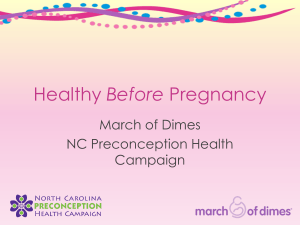
![Questionnaire used in the study Demographics GENDER: M [ ] F](http://s3.studylib.net/store/data/006712173_1-21c851410b04058d524e1b79e54e32b0-300x300.png)
